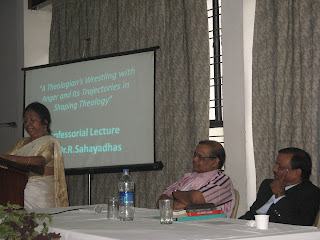 |
| Dr. Mohan Larbeer |
 |
| Rev. Raj Bharath Patta |
A public lecture on the topic "Remembering Ilavarasan, Interrogating Casteism: Reimagining Christian Public Witness in India" was held in UTC at 5:00 P.M. yesterday.
Rev. Raj Bharath Patta, the General Secretary of the
Student Christian Movement India (SCMI) gave the main lecture and it was moderated and commented on by Dr. Mohan Larbeer, the secretary of the Board of Theological Education of the Senate of Serampore College (BTESSC). The lecture was jointly conducted by UTC and SCMI.
Rev. Raj Bharath Patta explained the loss of life of Ilavarasan, a dalit man, as a murder and something for which all are responsible. He gave a blow by blow account of the issue which lead to the death of Ilavarasan. The violence of the Vaniyars against dalits was brought out clearly. He saw the incident as
1. The violence against dalit communities after inter caste marriages.
2. There is a anti-dalit hate campaign and also an attempt to say that they are coming up and dressing up like others.
3. There is a political conspiracy to spit venom against dalit communities and this is for the creation of an electoral constituency.
4. There is an ongoing increase of suicides among dalits in various places.
5. There is a nexus between caste and politics, caste and patriarchy and caste and power.
For Raj Bharath the need to remember Ilavarasan today is that he reminds us of several others and their struggles against injustice. Ilavarasan reminds us of
Rosa Parks, the modern civil rights movement and the life of resilience. Ilavarasan also reminds us of
Nelson Mandela and archbishop
OscarRomero. Rev. Bharath pointed out that high caste Hindu educated youth are campaigning against inter caste marriages and saying that their crusade is to preserve Indian traditions. He therefore said that inter caste marriages are the need of the hour if we have to thwart false traditions.
Dr. Ambedkar also had such a view.
Rev. Bharath then articulated the problem of caste with what
Felix Wilfred and
Satish Deshpande have written and talked about as our silence on caste. Rev. Bharath finally brought in an analysis from the bible in the form of the story of Cain and Abel and said that Ilavarasan's death is like Abel's death. It was not death but murder. The retort of Cain "Am I my brother's keeper?" is what we are doing by not talking about Ilavarasan. Good news for the poor is bad news to the rich.
He then talked of a positive story in the bible regarding Ruth and Boaz and how their marriage was inter-territorial and went beyond set boundaries. This is the same route the church must take in India. He ended with a letter written to Ilavarsan confessing our inability to help him and affirming that Ilavarasan is now an epitome of hope to the community.

Dr. Larbeer started by saying that he has always been a supporter of inter caste love marriages. He gave a succint report on the real situation of caste in Tamil Nadu referring to the problem between the Vaniyar dominated PMK and the dalits. He brought out the key issue of the economics of caste and how this was also very much an issue of how the social upward mobility of the dalits was a problem to other castes. He also reminded those present of the new expression of dalit capitalism. He ended by saying "No one can murder or kill love." Students and faculty from UTC and the SCMI unit from Goodwill Women's Christian College attended the lecture.
Dr. Sahayadhas introduced the speakers, Dr. Allan Palanna and Dr. George Zachariah made venue arrangements and took care of logistics, Ms. Veronica, MTh II and Mr. Paul Karunakar, BD III helped in the conduct of the programme and Rev. Dinesh, MTh II offered prayer.



































